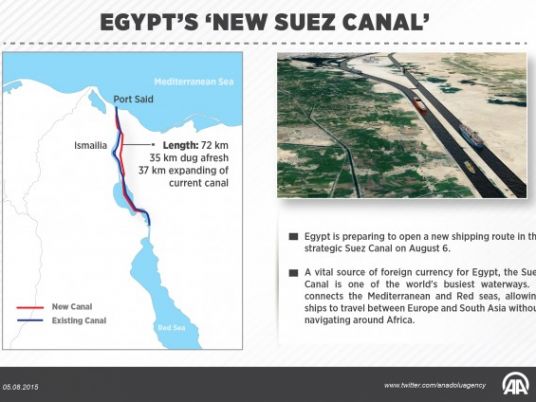
Egypt is preparing to open a new shipping route in the Suez Canal on Thursday. Egyptian authorities have dubbed the route as "Egypt's gift to the world."
A vital source of foreign currency for Egypt, the Suez Canal is one of the world's busiest waterways. It connects the Mediterranean and Red seas, allowing ships to travel between Europe and South Asia without navigating around Africa.
The following are some key facts about the Suez Canal:
History
The Suez Canal is a 193-kilometer sea-level waterway that connects the Mediterranean and Red seas.
Designed by French engineer Ferdinand de Lesseps, the canal was dug in 1859 and took 10 years to complete.
Around 6,000 foreign guests attended the opening of the Suez Canal in November, 1869. About one million Egyptian workers are believed to have taken part in digging the canal. Around 125,000 of the forced laborers died in the process, according to Egyptian historian George Kirlis.
In 1858, de Lesseps obtained permission from Khedive Said Pasha to create a company to construct the canal. The company was to operate the canal for 99 years from its opening.
Most shares in the Suez Canal Company were owned by Egyptian and French investors, but a financial crisis forced the Egyptian government to sell its shares in the company to the British government in 1875.
The Suez Canal Company remained under British-French control until 1956 when former President Gamal Abdel-Nasser nationalized the canal.
In 1956, the canal was closed following a coordinated attack by Britain, France and Israel in what is known as the Tripartite Aggression. It was re-opened one year later.
In 1967, the canal was closed again due to the Arab-Israeli War, also known as the Six-Day War.
The canal was re-opened in 1975 after Egypt regained full control of the waterway following the 1973 war with Israel.
Financial cost and revenues
There is no official estimate of the cost of the Suez Canal, but unofficial estimates put it at around £20 million in the value of the currency at that time.
There are also no official estimates of total revenues since the canal was opened in 1869, but according to CAPMAS, the state statistics agency, the canal made $47 billion in the past 10 years with a total of 182,000 ships passing through the waterway in the same period.
‘New’ Suez Canal
What the Egyptian government has dubbed as the “New Suez Canal” is in fact a new 72-kilometer shipping route connected to the main canal.
Digging began on Aug. 5, 2014 and was completed on July 29, 2015.
On July 25, six ships crossed through the new shipping route as part of a test-run by Egyptian authorities.
Egyptian President Abdel-Fattah al-Sisi will officially open the new shipping lane on Aug. 6.
Sisi, a former military general, came to power through a military coup when he overthrew Egypt’s first democratically-elected civilian president, Mohamed Morsi.
Total cost and expected revenues
The cost of the canal's new route did not exceed $4 billion, according to Mohab Mamesh, chairman of the state-run Suez Canal Authority (SCA).
Egyptian authorities raised $8.5 billion for the mega-project by selling non-tradable certificates with a maturity of five years at a 12 percent interest rate to Egyptian citizens.
The government claims the project will double the country’s Suez Canal earnings from the current $5.3 billion per year to some $13 billion annually.
Maritime expert Hamdi Barghout believes that the expected increased revenues will only materialize by 2023.
"The SCA will have to pay interest over the coming five years to Egyptians who bought the non-tradable certificates, which will represent a major burden on the canal," he told Anadolu Agency.
He said the only way to double the canal's earnings is "by increasing the cargoes of ships passing through the waterway."
Yehia Rushdi, head of SCA's unit for Sea Transport Economics, also said the canal's revenues are expected to double by 2023, despite "the new Suez Canal not differing from the old one in terms of depth, width or area."
"The importance of the project lies in developing the canal's axis and carrying out a number of development projects there," said Rushdi, who is also deputy head of the SCA's planning and studies unit.
He added that he expects world seaborne trade passing through the Suez Canal to surpass the current level of eight percent.
